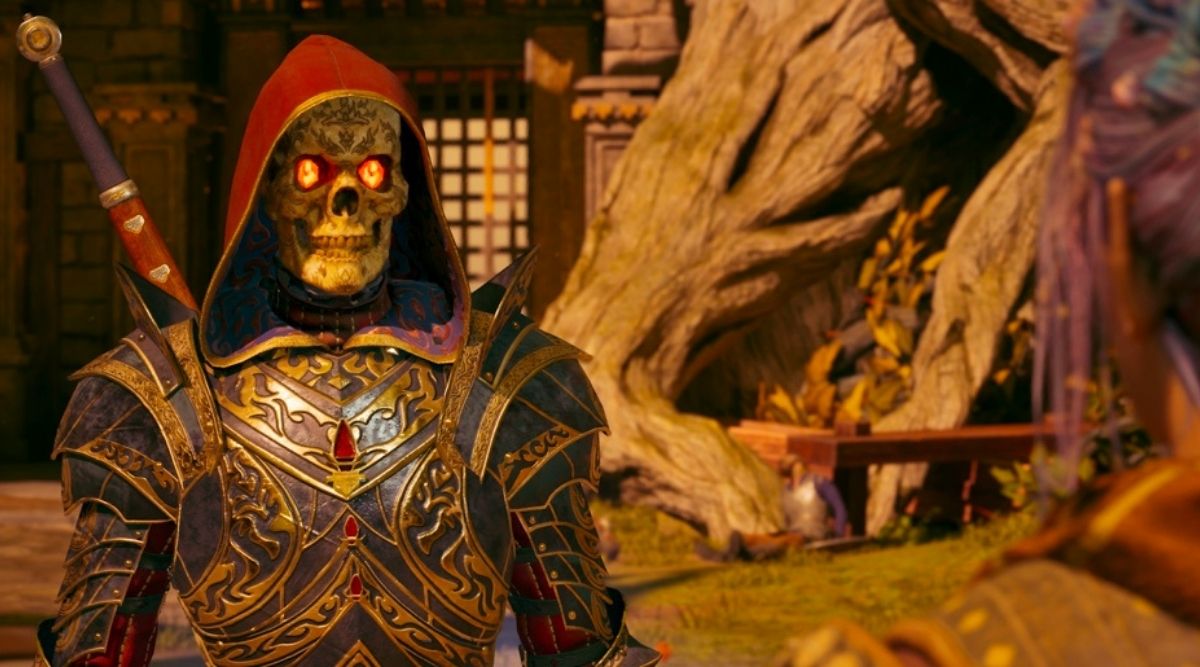This article includes spoilers for Sapadel’s storyline in Avowed.
In the opening moments of Avowed, The Envoy (player character) is tasked with finding a cure to a mysterious plague called the Dreamscourge. This madness-inducing malady is eventually revealed to be caused by a long-forgotten god named Sapadal. The ancient race known as the Ekida, or Godless, also disappeared at Sapadel’s hands. As the god speaks directly into The Envoy’s mind it begs to be freed from their eternal prison. But these facts give The Envoy pause.
But like many great stories, what you initially see isn’t everything. It’s soon made clear that Sapadel didn’t do these things on purpose. They were accidents brought about by fear, confusion, and in self-defense. These claims are hard to believe at first since the only source is Sapadel themself, but that changes thanks to the presence of Woedica, The Queen That Was.
To say that Woedica is a controlling goddess is an understatement. Anything that doesn’t fit her purposes or her self-imposed order for the world must be removed root and stem. Periodically throughout the game, Woedica appears, manipulating The Envoy into seeing the situation her way. Sapadel’s story is confirmed through these appearances, and a further wrinkle is added to the murky moral waters.
A key element of most moral codes is intent. Whether a result is intentional greatly impacts how we view an action and the one who took it. Accidents can never be murder. Neither can you accidentally steal something. While crimes can be accidental, there must be intent for them to warrant the harshest of punishments. But what if you are dealing with an individual who could accidentally cause a volcano to erupt or turn a city of people into the walking dead?
The conditions of Sapadel’s creation make their punishment in Avowed morally ambiguous.

Due to the special conditions of Sapadel’s creation, the other gods of the world never welcomed them. This means that this being of immense power had to teach itself how to wield its great powers. This is a clear recipe for disaster. It was this lack of self-control that spawned the Dreamscourge.
Sensing the return of its old enemy Woedica through the arrival of her servant Lödwyn, Sapadel’s panic manifested into the deadly disease. But Sapadel promises that, if released from their cage, they will have the control they need to reign in their terror and be a source of good for The Living Lands.
All these elements come together as The Envoy finally stands before Sapadel with the final choice before them. To free the diety or use their special connection to kill the god. Strong arguments can be made for both choices, even if many would consider the latter distasteful.
The merciful thing to do is to free Sapadel. With its lack of teaching and unaware nature, it would be easy to look at their past failings akin to a child who accidentally found a parent’s gun. Sapadel didn’t know what they were doing. They lashed out in fear, only later realizing the full effects their terror would wreak. Now, they understand. And what’s more, they will have The Envoy with them to help keep them level. Surely, they deserve a second chance? Don’t we all?
While this is a stance most would take in our world, individuals can’t single-handedly wipe out cities in our world. How far good intentions can get you is a tricky proposition, especially since The Envoy holds no authority in The Living Lands. They are not a representative of the people who will have to live with the choices they make. Does The Envoy have the right to put their lives on the line?
This is where option two steps in. Putting the lives of thousands on the line in the hope that a maladjusted god doesn’t blow their stack sounds a bit irresponsible. Is it tragic that the other gods didn’t help them learn about their abilities and teach them the control they need? Of course. Even more so, they were hunted and caged simply for the manner of their creation. But what’s done is done, and it is the now that must be dealt with.
Choosing how to deal with Sapadel is an intentionally impossible choice.

Despite the coldness of the arguments, they do bear moral weight. Many moral codes put the needs of the many over the needs of the one, arguing that an act that helps the most and hurts the fewest is always the clearest path. While this outlook provides clear guidelines, it lacks a level of nuance that leaves lives feeling like little more than numbers in a ledger.
The lack of any mid-range option goes a long way to making the choice so hard. In the real world, given the unintentional nature of Sapadel’s crime, we might find some third path. Like freeing them but stripping them of some/all of their power. They don’t deserve death, but they can’t just be set free, either.
The Envoy stands in an uncomfortable position without knowing what will ultimately come of their decision. The choice of what to do with Sapadel is unclear at best. Both options are fraught, and simply applying the morality we are accustomed to doesn’t work due to the special nature of the circumstances. That’s assuming Sapadel is being completely honest with The Envoy. Whether through deceit or centuries of repression due to guilt, it’s always possible that all the facts are never laid bare, even if they feel fully addressed.
And that is what makes fantasy one of the most compelling genres of fiction. It takes tried and true concepts like morality and asks “What if?” How we respond to these problems teaches us things about ourselves, our outlooks on life, and what we value most. Avowed takes full advantage of this ability, creating a complicated situation that leaves plenty of room for questions while forcing players to find their own answers.
Avowed is available on Xbox Series S|X and PC, and is playable via Game Pass.







